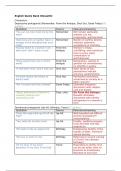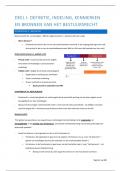English Quote Bank (Rossetti)
Characters:
Depressive protagonist (Remember, From the Antique, Shut Out, Good Friday) (8
quotes)
Quotation Source Relevance/meaning
‘You can no more hold me by the Remember Will remain spiritually
hand’ present, but not
corporeally: spiritual bond
‘Darkness and corruption leave a Remember Burden of earthly desires
vestige of the thoughts that once relieved; optimistic
I had’ acceptance of mortality
‘Doubly blank in a woman’s lot: I From the Women’s empty,
wish and I wish I were a man’ Antique unfulfilling, and restrictive
lives in every class:
lamentation of
worthlessness
‘None would miss me in all the From the Resignation, women in
world’ Antique general not remembered,
no afterlife in poetry
‘It had been mine, and it was lost’ Shut Out Keen sense of loss,
possessives indicate
previous comfort/home
‘He took mortar and stone to Shut Out Permanent severance,
build a wall’ ostracised by society as a
fallen woman?
‘Am I a stone and not a sheep?’ Good Friday Extended metaphor;
disconnect with religion,
cold and distant
‘Sharp awareness of women’s Fass, critic On From the Antique,
uniquely passive and Rossetti ultimately
monotonous life’ discontent with earthly
entrapment in a woman’s
form
Devotional protagonist (Up-hill, Birthday, Twice) (7 quotes)
Quotation Source Relevance/meaning
‘Does the road wind up-hill all the Up-hill Well-travelled yet difficult
way?’ journey (purgatory?)-
contemplative
‘Yea, beds for all who come’ Up-hill Finality, soothing answers,
trust and faith override
original sin
‘My heart is like an apple tree’ Birthday Prelapsarian fertility of the
Garden of Eden, Romantic
natural divinity
‘My love is come to me’ Birthday Referring to second coming
of Christ (‘the ultimate
birthday’)
(‘O my love, O my love’) Twice Bracketed as earthly love
becomes ‘O my God, O my God’ can be set aside; then no
brackets as emotionally
liberated to love God
, ‘All that I have I bring, all that I Twice Reminiscent of marriage
am I give’ vows: devotion and
obedience to God
empowering, unlike to man
‘Depict disillusionment and Harrison, On Twice, crux of
betrayal in love and… the critic Rossetti’s inner conflict
renunciation of earthly ideals’ between sexuality and
religion; divine or earthly
love
Empowered protagonist (Maude Clare, No Thank You John, Jhansi) (8 quotes)
Quotation Source Relevance/meaning
‘With a lofty step and mien… Maude Clare Maude Clare subverts
Maude Clare was like a queen’ archetypal scorned woman
antagonist, presented as
regal and powerful
‘Waded ankle-deep for lilies in Maude Clare Vibrant and passionate
the beck’ relationship; flora as a
euphemism for purity and
sexual freedom
‘Pale with inward strife’ Maude Clare Emotional frailty, cannot
contend with a strong
woman
‘Meg or Moll would take pity upon No Thank Interchangeable- loveless
you’ You John arranged marriage simply a
role to play
‘No fault of mine made me your No Thank Projecting blame, Rossetti’s
toast’ You John dismissal of idea women
owe men who they
intentionally entrap
‘Rise above quibbles and No Thank Though speaker is stoically
shuffling’ You John mature, John is childlike and
whiny
‘Courage, dear, I am not loth’ Jhansi Liberated, courageous
woman (but autonomous
decision or mimicry?)
‘Complex negotiation of power Simon Avery, On Jhansi, No, thank
which enables the women to critic you, John, and Maude
achieve agency, equality and Clare, subverting
self-sufficiency’ narratives to a female
perspective
Romantic protagonist (Echo, Winter, Song) (7 quotes)
Quotation Source Relevance/meaning
‘Soft rounded cheeks and eyes as Echo Youthfulness, intense
bright as sunlight on a stream’ focalisation on memory,
motif of water and
reflectiveness of a stream
‘Pulse for pulse, breath for Echo Remembrance of intimacy,
breath’ mildly erotic Romantic
connotations
‘My secret’s mine, and I won’t Winter Autonomy, self-ownership,
tell’ feminist messaging (idea of
forbidden knowledge =





